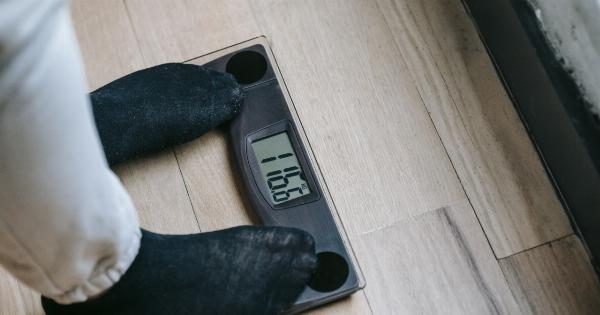Weight loss is a topic that often comes up in discussions about health and wellness. Many individuals strive to achieve a healthier weight, whether it is for aesthetic reasons or to improve their overall well-being.
However, when it comes to weight loss, there is a lot of debate about the most effective approach. One of the key considerations in this debate is whether quick or slow weight loss is more sustainable in the long term.
In this article, we will explore the advantages and disadvantages of both approaches to help you understand which one may be better suited to your goals and lifestyle.
Quick Weight Loss
Quick weight loss refers to a strategy that aims to shed a significant amount of weight in a relatively short period, typically within a few weeks or months.
This approach is often associated with low-calorie diets, intense exercise routines, and sometimes with the use of weight loss supplements or medical interventions.
Advantages:.
1. Rapid Results
One of the primary advantages of quick weight loss is that it provides rapid results. If you have a specific event or deadline in mind, such as a wedding or a vacation, quick weight loss can help you meet your goal in time.
This can be motivating and boost your confidence as you see the numbers on the scale drop quickly.
2. Increased Motivation
Seeing quick progress can help to enhance your motivation levels. It can be encouraging to witness the direct impact of your efforts and keep you committed to your weight loss journey.
This increased motivation can be beneficial, especially during the initial stages when forming new habits and routines.
3. Improved Health Markers
Quick weight loss can also lead to improvements in certain health markers, such as blood pressure, cholesterol levels, and blood sugar control.
Losing excess weight can reduce the strain on your body and potentially lower your risk of developing chronic conditions like heart disease and type 2 diabetes.
Disadvantages:.
1. Muscle Loss
During quick weight loss, a significant portion of the weight lost may come from muscle mass rather than fat.
Severe calorie restriction and excessive exercise can cause your body to break down muscle tissue for energy, which can negatively impact your overall metabolism and body composition.
2. Nutritional Deficiencies
Quick weight loss often requires a highly restricted calorie intake, which may not provide sufficient nutrients for your body’s needs.
This can lead to nutritional deficiencies and potentially compromise your immune function, bone health, and overall well-being.
3. Unsustainable Lifestyle Changes
Quick weight loss methods are often difficult to maintain in the long term.
Drastic changes in diet and exercise routines may not be sustainable for most individuals, leading to a higher likelihood of weight regain once the strict regimen is no longer followed. This can create a cycle of constant weight loss and weight gain, commonly known as “yo-yo dieting.”.
Slow Weight Loss
Slow weight loss, on the other hand, focuses on making gradual changes to your lifestyle in order to achieve a sustainable and maintainable weight loss.
This approach typically involves small, consistent calorie deficits and a focus on overall healthy habits.
Advantages:.
1. Sustainable Lifestyle Changes
Unlike quick weight loss methods, slow weight loss allows for gradual and sustainable lifestyle changes.
By making small adjustments to your eating habits and exercise routine, you are more likely to adopt healthier behaviors that can be maintained in the long run. This can help you achieve lasting weight loss and build healthy habits for life.
2. Preserves Muscle Mass
Slow weight loss is more likely to preserve your muscle mass compared to quick weight loss. By focusing on maintaining a balanced diet and incorporating strength training exercises, you can help preserve and even build lean muscle.
This is essential for maintaining a healthy metabolism and achieving a toned and fit physique.
3. Improved Relationship with Food
Slow weight loss promotes a healthier relationship with food as it allows you to enjoy a variety of foods in moderation. It emphasizes mindful eating and encourages listening to your body’s hunger and fullness cues.
This approach reduces the chances of developing an unhealthy obsession with food or experiencing feelings of deprivation often associated with restrictive diets.
Disadvantages:.
1. Slower Results
One of the main drawbacks of slow weight loss is that the results may not be immediately noticeable. It can take longer to see significant changes in your weight or body composition compared to quick weight loss methods.
This slower progress may require more patience and perseverance.
2. Potential Lack of Motivation
For individuals who thrive on instant gratification, slow weight loss may be less motivating. The gradual nature of this approach may not provide the same initial boost of motivation as seeing quick and dramatic results.
However, it’s important to remember that slow and steady progress is more sustainable in the long term.
3. Less Suitable for Short-Term Goals
If you have a specific short-term goal or deadline, such as fitting into a certain dress for an upcoming event, slow weight loss may not be the most suitable approach.
It is important to assess your individual circumstances and priorities to determine which method aligns best with your specific goals.
Conclusion
Both quick and slow weight loss methods have their own advantages and disadvantages. Quick weight loss can provide rapid results and increased motivation, but it often comes with the risk of muscle loss and nutritional deficiencies.
On the other hand, slow weight loss promotes sustainable lifestyle changes and preserves muscle mass, but it requires patience and may not be suitable for short-term goals.
Ultimately, the choice between quick and slow weight loss depends on your personal circumstances, preferences, and long-term goals. It is important to prioritize your overall health, well-being, and the maintainability of your chosen approach.
Consulting with a healthcare professional or a registered dietitian can also provide personalized guidance to help you make an informed decision.






















